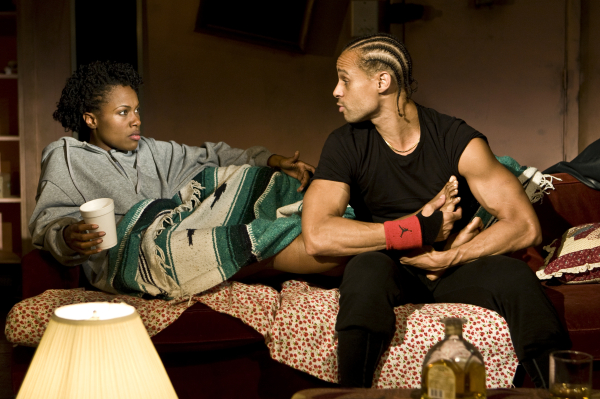Sunset Baby

(© Monique Carboni)
Detroit native Dominique Morisseau entered the off-Broadway scene last season with an in-depth look into the political and racial history of her hometown in Detroit ’67, presented at both the Public Theater and the National Black Theatre. Morisseau returns with her new play, Sunset Baby, at the Bank Street Theater, which looks under the hood of a different city, but with the same political fervor.
In the Labyrinth Theater Company production, Morisseau places us in the slums of New York City where drug dealing and armed robbery mean survival for Nina (DeWanda Wise) and her fast-talking boyfriend, Damon (Harvey Gardner Moore). They spout dreams of world travel and social climbing as they sit in Nina’s ramshackle apartment (designed by Lee Savage) and hide stacks of illicitly earned cash in books and picture frames.
The play’s text contains the same politically charged voice Morisseau displayed in Detroit ’67 — and it undoubtedly is one with sharp insight into the African-American experience and a passion for excavating its emotional nuances. This zeal, however (under the direction of Kamilah Forbes), often overpowers the characters who function as conduits for Morisseau’s bold social statements.
Morisseau hands Moore (Damon) some of her most politically impassioned speeches, which he rambles off using a droning cadence that unfortunately turns Morisseau’s keen observations into white noise. Damon’s hot-blooded nature, however, is a natural fit for Nina, who, contrary to her current ignoble state, is the daughter of two former black revolutionaries. Though we are offered few details about her parents’ specific claims to fame, we can assume that her mother developed some level of notoriety before her death, having left Nina a series of letters that we soon learn are of substantial value. This value extends both to the archives of black history and to Nina’s absent father, Kenyatta (Tony nominee John Earl Jelks) who has unexpectedly popped up on her doorstep in search of them. Though he enters waving a white flag of surrender, Nina comes at him guns blazing, seeking retribution for the pain he has caused her, all the while hoping he volunteers heartfelt penance for his past choices that put “the cause” before his family’s well-being.
Is it noble to sacrifice your private needs for the greater good or does the greater good start in the privacy of your home? This conflict between political activism and family loyalty is a compelling one and Morisseau gives us pause when deciding which side of this argument to endorse, even with blatant sympathy in Nina’s corner. Her dialogue, however, sits too comfortably in this realm of intellectual debate, molding articulate mouthpieces for these conflicting arguments rather than flesh-and-bone characters who organically paint a picture.
As Wise and Jelks flesh out their respective positions during their various encounters in Nina’s apartment, Forbes directs the father/daughter pair at only two volumes — Wise typically maintaining the louder of the two. True, she is releasing years of pent-up anger, but Wise’s performance provides little more than anger and stone-faced coldness. Calloused from years of childhood neglect and the every-man-for-himself life of a street hustler, Wise capably bears this hardened exterior. However, hints of vulnerability do not seem to follow any particular character arc. Rather than gradually softening her protective shield, Nina remains in an indecipherable state of emotional limbo, made visually apparent as she changes between her street outfit — a tight-fitting dress and long flowing wig (costumes by ESOSA) — and an oversized sweatshirt that she curls up into like an infant returning to the womb.
Jelks does a fine job in his paternal role, quietly taking these blows from his daughter while clearly boiling with repressed emotion beneath the surface. Wise and Moore, however, get the meat of the play, with Jelks serving more as a foil off of whom these two young actors can ricochet. Fortunately, he does get a few moments to shine, delivering a series of eloquent monologues into a camera at the front of the stage (for reasons I’ll refrain from disclosing). Morisseau’s strong voice is well-suited for these direct addresses and shines in Jelks’ capable hands, making us wish the camera would just keep rolling.











